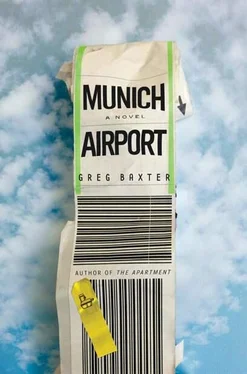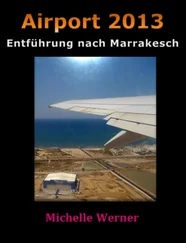Greg Baxter - Munich Airport
Здесь есть возможность читать онлайн «Greg Baxter - Munich Airport» весь текст электронной книги совершенно бесплатно (целиком полную версию без сокращений). В некоторых случаях можно слушать аудио, скачать через торрент в формате fb2 и присутствует краткое содержание. Год выпуска: 2015, Издательство: Twelve, Жанр: Современная проза, на английском языке. Описание произведения, (предисловие) а так же отзывы посетителей доступны на портале библиотеки ЛибКат.
- Название:Munich Airport
- Автор:
- Издательство:Twelve
- Жанр:
- Год:2015
- ISBN:нет данных
- Рейтинг книги:4 / 5. Голосов: 1
-
Избранное:Добавить в избранное
- Отзывы:
-
Ваша оценка:
- 80
- 1
- 2
- 3
- 4
- 5
Munich Airport: краткое содержание, описание и аннотация
Предлагаем к чтению аннотацию, описание, краткое содержание или предисловие (зависит от того, что написал сам автор книги «Munich Airport»). Если вы не нашли необходимую информацию о книге — напишите в комментариях, мы постараемся отыскать её.
Greg Baxter's bold, mesmeric novel tells the story of these three people over the course of three weeks, as they wait for Miriam's body to be released, grieve over her incomprehensible death, and try to possess a share of her suffering — and her yearning and grace.
MUNICH AIRPORT is a novel for our time, a work of richness, gravity, and dark humor. Following his acclaimed American debut, MUNICH AIRPORT marks the establishment of Greg Baxter as an important new voice in literature — one who has already drawn comparisons to masters such as Kafka, Camus, Bernhard, and Murakami.
Munich Airport — читать онлайн бесплатно полную книгу (весь текст) целиком
Ниже представлен текст книги, разбитый по страницам. Система сохранения места последней прочитанной страницы, позволяет с удобством читать онлайн бесплатно книгу «Munich Airport», без необходимости каждый раз заново искать на чём Вы остановились. Поставьте закладку, и сможете в любой момент перейти на страницу, на которой закончили чтение.
Интервал:
Закладка:
When we met, we often met at Bedford Square, around lunchtime, when she could get away from the museum for an hour or so. I would pick up some sandwiches on the way, or some pasta salad. She did all the talking, all the time. Her job was interesting and full of intrigue. It seemed very obvious to me that what qualified for expertise in her field was vastly different from what qualified for expertise in mine. In her field, expertise could be proven in the smallest ways, in the tiniest measures of breathtaking erudition, genius, and skepticism. Whereas the world everywhere else — the one my work inhabited, or held dominion over — strived, with banality and prejudice, to prove expertise in grand ways, in universalities, or the impotent and stereotyped language of political opinion, journalism, corporate branding, critical thought, or art. We first met at a British Museum event. She gave a talk, and I went up afterward to ask her a question. I said I really enjoyed listening to her speak, and then I mentioned that her talk wasn’t the first time I’d heard about the subject matter, but that I’d read about it in a book, and then I named the book. She said, I love that book. I said, My father wrote it. She said, Are you serious? She was about to turn around and tell the whole room, all her colleagues and all the visitors, but I touched her arm and pleaded. I said, Please, please do not repeat that, I should not have mentioned it.
Eight months later, or nine months, just shortly after the affair ended, exactly as she had predicted it would, with pain and humiliation for everyone, I got on a train very early one morning and traveled to Wargrave. I knew where she lived, but I hadn’t gone there to find her, or to confront her husband. I think I went there because it seemed like a menacing thing to do, just to be there, and I felt like doing something menacing, I felt like being menacing. I arrived at dawn. It was cold and foggy. It was probably early spring, possibly March or April. I was the only soul who disembarked at Wargrave, but there were a few people waiting on the platform for the train to Paddington, or perhaps to Twyford. The Thames goes by Wargrave, and it is a pleasant stretch of the Thames. I wore a long black coat. I walked around. There isn’t much to see there. There are some nice pubs. A couple of housing developments. I got a lot of suspicious looks. I went into a café and had some breakfast. When it started to warm up, I went to the Thames and sat under a tree, like a hobo. Could it be that a new life was within me, a life of menace, of trespassing, of terrorizing small towns by simply visiting them, when I had no reason to visit them? At lunchtime I went to a pub called the St. George and Dragon. I ordered some food and sat outside. I had a couple of beers. It got a little crowded. When I was finished, I told the waitress the name of the woman, and I asked if she ever came around. The waitress said she didn’t know anyone by that name, and then a few minutes later the manager came over and asked me who I was looking for, and when I told him the name he told me to wait. I said to him, It was just a question, an old friend, I used to know her. The manager told me to wait anyway, not to go anywhere, stay right there, he knew exactly who I was. I had paid, so I just got up and left, and I hurried toward the station. I ran. I kept looking behind me. I was thinking, Please let a train be waiting when I get there. But there was nothing. I had to wait about thirty minutes for the train. I paced and paced around. I looked for hiding places. I would have taken a train going in either direction. I panicked. I wanted so badly to be the kind of man who would wait for the husband in the pub, or at least the kind of man menacing enough to crawl over a fence and sit and smoke a couple of cigarettes in the woman’s back garden. Maybe I should have come at night. I kept watching down the Station Road to see if somebody was coming. My mind produced images of speeding cars, of a gang of Wargravers brandishing lead pipes, cricket bats, possibly oars. Nothing appeared.
What a dull place Wargrave really was. No doubt it is as dull today as it was then. The woman hasn’t left. I’ve looked her up from time to time, and she is still with the British Museum, she still has an office there. She has not run off to Cairo or Jerusalem alone, to live in airy apartments that overlook busy marketplaces, or to walk over hills of sand or dust, wearing a floppy hat and some kind of tan blouse. Nobody in Wargrave is aware of how terrible it is for this woman to be among them, to have quiet English dinner parties, to speak the way they speak, to congregate on sunny days at the pub by the Thames and slowly eat and drink herself to death, alongside her neighbors. My father and I are boarding now. The other passengers are standing, crowding the gate. They watch us. Our jovial friend with vampiric shoulders pushes my father toward the entrance to the jetway, and I follow. I show our boarding passes and passports. My father wants to tell me something, but he is pushed swiftly into the jetway. I am next. I shouldn’t be so hard on Wargrave. It’s no different from the place I’m going. It’s no different, for that matter, from Walluf.
Between the time I met Miriam in Cologne and my affair with the archaeologist, I traveled to the lodge in Scotland alone. It was the hottest summer in England for a hundred years or something. London was miserable. Everything stank. Even Bedford Square stank. So I called up the lodge and said I wanted a room for a night, as soon as possible. They said they had nothing left for the summer, unless I could book for a minimum of three nights. I told them my father’s name, I explained he had come regularly, that he had honeymooned there, visited a few times with my mother, then with us. The woman at reception didn’t know what I was talking about, but the owner, to whom I finally spoke, remembered, and she offered me a suite, their best room, on the Sunday of the week I telephoned, but they would have to charge full price for it. What’s full price? It’s four hundred and fifty pounds, she said, plus an extra twenty pounds for breakfast. I flew from London to Edinburgh on the Sunday morning and rented a car. I drove north, in the direction of Perth, but not along the motorway, then east. Actually Glasgow was the more convenient airport, but I’d come through Glasgow on the previous two occasions, and I wanted something different. The air got cooler, but it wasn’t quite chilly — people in the towns I drove through wore shorts and flip-flops. I stopped at some places along the way, to get food or stop at fruit stands or ice-cream stands. It was June, so the sun stayed high in the sky all day. I drove with the windows down. As the roads got smaller and the views from the roadsides became more and more magnificent and fearsome, I pulled over and stood. When I finally made it to the lodge, I found the parking lot completely full. I checked in. I was shown to my room. I confirmed my dinner reservation. I’d hoped to get a booth table all to myself — the regular table, which my father always made sure to reserve weeks in advance — but there was no hope. I would get a little table by the window. That’ll be fine, I said. I showered and put on a suit and went down to the lounge for a few drinks and to read the papers. The lounge was packed. People had been out on the water all day, or cycling around, or hillwalking, and they were having refreshments and talking about the unbelievably warm conditions. The vast majority of them were retired. The vast majority were English. Many of them must have been there for days, because they spoke to each other like old chums. One of them asked to take a look at a paper I had finished with, and I said, You bet, be my guest. They were overjoyed, it turned out, to have an American there, and they would not believe I was just an ordinary foreigner living in London, trying to get away from the heat. I was wearing a nice blue suit and a white shirt. When they found out — they asked and I told them — what room I was staying in, and that I was alone, they concluded that I must be in entertainment, I looked like I belonged in entertainment. Eventually they rounded themselves up after a few drinks to go upstairs and prepare for dinner. I went outside for some fresh air. It was evening, though still bright, and finally starting to cool. I walked along the jetty where some boats were tied. Little wooden fishing boats with oars. They were very clean and dry. A man came toward me. He worked for the hotel. He came up beside me and we stood and looked around at the water and the mountains behind them. I said, I don’t remember there ever being boats here. He said they’d always been there, but usually it was too cold and the conditions were too dangerous to let people out on them. But that evening it was calm, it was warm and windless, and the lake was flat. I said, I’d like to take a boat out for a few minutes before dinner starts. He checked his watch and asked what time I was eating. Eight o’clock, I said. Then you have time, he said. Does it cost any money? I asked. He said it was free. We stood for a few seconds longer and I said, So I can pick any one I like? Of course, he said — he was putting them away for the night but he didn’t mind me being out until eight on such a nice, bright evening. I hopped into one and he untied me, threw me the line, and wished me a pleasant, if brief, boat trip. I rowed out a hundred meters, two hundred meters. The lake wound around a jutting stretch of land in the distance, and I thought I’d row there, take a look at the rest of the lake, then turn around and go back and get dinner. As I rowed, I began to feel a romantic attachment to the view around that corner, even though I had no idea what it would be like, apart from the safe assumption that it would be a lot like the view I had already. I began to visualize the scenery beyond the gap and it seemed to me as though music was beginning to make noises at the mountaintops, in the trees, or as though the music I heard had metamorphosed into trees and mountaintops. I started to feel that I had to see the view around that corner, it was imperative, that I would never know myself unless I set eyes upon the rest of the lake. It did not take very long to realize that the proximity of the gap was an illusion. I kept rowing and rowing, but I never seemed to get closer to it. So I stopped where I was and floated for a while in the still, black glassiness of the water. The man gathering the boats for the evening was making very little noise. He looked at me when I looked at him, but neither of us waved, and he looked away. I couldn’t smell anything except the water and timber of the boat. I leaned over and put my hand in the water. The water was freezing. I leaned a little farther and put both hands in. I picked them out and felt the texture of the water between my fingers, on my palms and on the backs of my hands. I sat like that for a while, slumped over the edge of the boat, looking at my hands, dipping them in the water and watching the water drop off them. When I looked up, I saw that the first dinner guests of the evening had assembled outside the restaurant, on the shore, to see what I was doing. I couldn’t imagine what conclusions they had come to. When I sat back up and grabbed the oars and starting rowing again, they waved, and they waved.
Читать дальшеИнтервал:
Закладка:
Похожие книги на «Munich Airport»
Представляем Вашему вниманию похожие книги на «Munich Airport» списком для выбора. Мы отобрали схожую по названию и смыслу литературу в надежде предоставить читателям больше вариантов отыскать новые, интересные, ещё непрочитанные произведения.
Обсуждение, отзывы о книге «Munich Airport» и просто собственные мнения читателей. Оставьте ваши комментарии, напишите, что Вы думаете о произведении, его смысле или главных героях. Укажите что конкретно понравилось, а что нет, и почему Вы так считаете.











